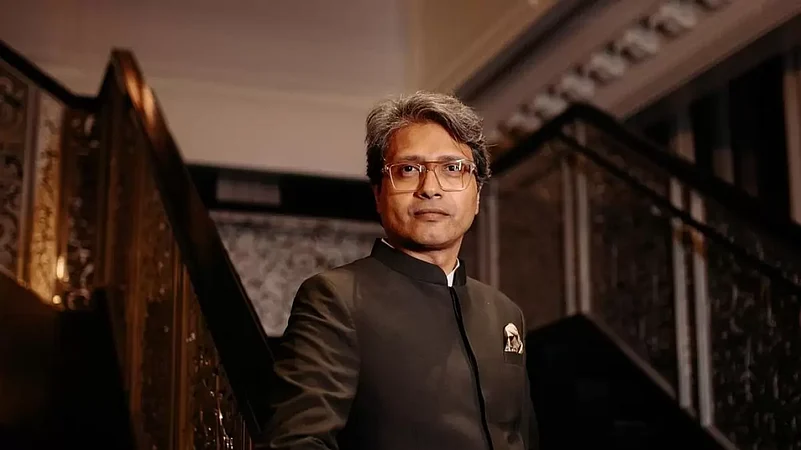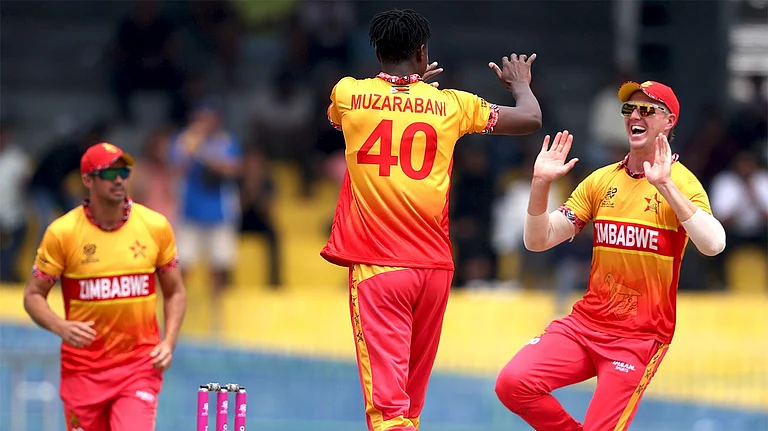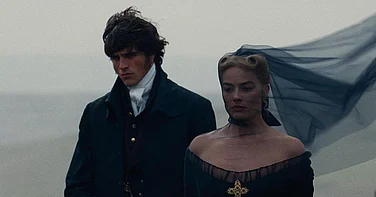Nikhil Nagesh Bhat, a leading Indian writer-director, commenced his career as a Creative Consultant for Anurag Kashyap's 'Black Friday.' His debut feature, 'Salunn,' earned acclaim at the Cairo Film Festival, followed by accolades for subsequent works like 'Biogas ka Bindaas Business' and 'Brij Mohan Amar Rahe.' His notable series include 'Rasbhari' and 'The Gone Game.' As co-director of documentaries like 'Seven Tales from an Island' and associate director of 'The Great Indian Tiger Project,' Nikhil displays versatility. Most recently, Nikhil also worked on the action feature film 'Kill,' co-produced by Dharma Productions and Sikhya Entertainment which premiered at the Toronto International Film Festival in 2023.
In a recent conversation with Outlook's Abeer Anjum, director Nikhil Nagesh Bhat, the mastermind behind the recently released film 'Apurva,' delves into the intricate details of the creative process, challenges faced during production, and the unique aspects that make 'Apurva' a compelling cinematic experience. Nikhil continues to shape the narrative of contemporary Indian cinema, showcasing his unwavering commitment to creative innovation. Nikhil provides a comprehensive and insightful look into the making of 'Apurva,' offering a glimpse into the challenges, creative decisions, and influences that shaped this intense cinematic experience. The film stars Tara Sutaria, Abhishek Banerjee, Dhairya Karwa, and Rajpal Yadav in leading roles.
Commencing the shoot in November 2022, Nikhil reflects on the challenging production schedule, shooting in the intense terrain of Rajasthan near Jaisalmer. With limited time for preparation due to overlapping shoots, the remote location presented difficulties, coupled with extreme temperatures and the presence of wildlife. He says, "I started shooting in November, in fact first of November 2022. I was shooting till September end. I had less time to prep for it because while shooting for kill, I started shooting for Apurva. We were shooting in Rajasthan, 40 km away from Jaisalmer, we went over there and we set up over there a few days before. So that was the way we had to cover up for the time also the terrain was very difficult since Jaisalmer is a very hot place."
Nikhil shares that while depicting the Wild West scenario in India, he aimed for a classic film without shaky or turbulent camera work. The vast, barren terrain of Jaisalmer, combined with the brutality of the narrative, contributes to the cinematic experience of 'Apurva.' Talking about the cinematic influences he says, "Nothing particularly but I wanted to depict the scenario of the Wild West in India, the terrain is such that there is nothing in miles and miles, and the brutality of the terrain beautifully blends in the cinematic experience. Second for Apurva, I wanted the film to be a classic, so no shaky or turbulent camera work."
Discussing the unconventional casting of Tara Sutaria, Nikhil emphasizes her ability to portray vulnerability initially, a crucial element for her character Apurva. The character's transformation from weakness to resilience is a central theme, beautifully portrayed by Tara. He says, "The character of Apurva needed two things, the most important thing was when she should be not seen as a threat and she should be seen as weak and vulnerable. Tara looks that part, she doesn't pose any challenge to these guys who kidnap her in the film. She is begging to leave her and then from there is a transformation she stands up for herself for her survival, that was the transformation I needed and Tara portrayed that part beautifully."
Nikhil draws distinctions between Abhishek Banerjee's previous gangster character in 'Paatal Lok' and his role as Sookha in 'Apurva.' While Hathoda Tyagi carried childhood trauma, Sookha is portrayed as unapologetically dark, lacking any trace of humanity. Abhishek struggled to find relatability in this starkly different character. He says, "The character Hathoda Tyagi whom Abhishek played in Paatal Lok, thinks from a place where he has seen a lot of problems in his childhood there was that trauma that he carried in the character. While Sookha in 'Apurva' is just unapologetic, he is just dark, he enjoys what is doing and doesn't even think what he is doing is wrong. Sookha is a criminal, there is no humanity in the character."
Explaining the rationale behind casting Rajpal Yadav as a gangster, Nikhil emphasizes that criminals often look like ordinary citizens. Rajpal's ability to portray a criminal without any distinctive features adds an element of surprise for the audience, with his character refraining from displaying any emotion. While addressing the subject Nikhil says, "I feel, that people who kind off look like normal citizens are criminals. Criminals don't have any distinct features and the fact that Rajpal sir is a fantastic actor in every body of work that he has contributed. What he does in the film not even Abhishek does, that's a shocker for the audience. Criminals are very regular guys, who do crimes because something has rubbed their ego the wrong way and that is what I wanted to portray."
Having completed 'Apurva,' Nikhil expresses a newfound interest in violence and thriller genres, feeling a natural inclination towards action films for the immediate future. Nikhil says, "Now as I have done Apurva, I feel violence and thriller that is what I am feeling. It is something that is coming naturally to me, so I think I am in that state that I want to do action films for some time."
Nikhil cites various directors such as Anurag Kashyap, Ram Gopal Verma, Ram Madhavan, and Meghna Gulzar as influences. He highlights that, more than filmmakers, films themselves inspire him, mentioning the excitement he feels for exceptional works like 'Oppenheimer.' Nikhil says, "There are so many, Anurag Kashyap being one, Ram Gopal Verma, Ram Madhavan and Meghna Gulzar. Not just from India many from the international circuit as well. More than the filmmakers its the films which influence me. I feel good films excite me a lot, a film like Oppenheimer excites me. I can keep watching the film ten times it still wont be enough."
Nikhil discusses the underutilized role of sound in filmmaking, citing its impact on the emotional and psychological dimensions of storytelling. He applauds Anurag Kashyap and Ram Madhavan for their adept use of sound in their films, acknowledging its potential as a character in the narrative. While talking about the usage of sound and music in film he says, "Sound has not been utilized so much and it plays a big role in the making of the film. Sound designs, the music it light up a film. I'll give an example when I was working on 'Kill,' thankfully to Subhash Rao who was my sound designer, the kind of impact which the sound design gives to the film it very much visible. It's something in my opinion that has not been explored much in our films."
























